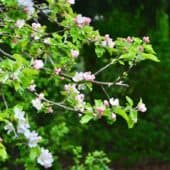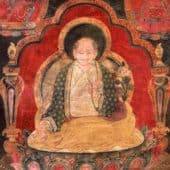Who it’s for
The thought training teachings are for those who are interested in transforming their minds by transforming how they think. These teachings enable us to change how we interpret things so that we will experience them in different ways.
Eager to transform your mind and enrich your day with short, easily digestible nuggets of Dharma? These commentaries feature short informal talks that relay the Buddha’s teachings in ways that can quickly and easily be put into action.
Teachings highlighted in bold are listed at the bottom of the page.
Content and resources
Wisdom of the Kadam Masters
The Kadam masters were a community of monks who lived in the eleventh and twelfth centuries. They lived a simple life yet were esteemed for their wisdom. They were known for teachings that clearly illustrated how happiness for oneself is rooted in a dedication to the happiness of others. The Wisdom of the Kadam Masters is available from Wisdom Publications.
From 2016-2017, Venerable Thubten Chodron offered short talks on this text: Wisdom of the Kadam Masters (2016-2017)
108 Verses Praising Great Compassion
108 Verses Praising Great Compassion is a text written by the Mongolian Bhiksu Lobsang Tayang who was renowned for his great knowledge of Buddhism and sacred practices. It is also known as A Precious Crystal Rosary. The text consists of 108 four-lined verses with seven syllables to a line, each verse praising different elements of great compassion in metaphors and allegories. Access the full translation of this text by Gelong Thubten Losel (Jose I. Cabezon) here.
Venerable Chodron offered teachings on this text during the Chenrezig retreats at Cloud Mountain Retreat Center and Sravasti Abbey from 2006-2011: 108 Verses on Compassion (2006-11)
Eight Verses of Thought Transformation
In 2018, Venerable Chodron gave a series of teachings on Geshe Langri Tangpa’s Eight Verses of Thought Transformation. Written in the 12th century, these verses are a short summary of the lojong teachings: Eight Verses of Thought Transformation (2018).
In only eight verses, this text explains the importance of cherishing others. Venerable Chodron’s commentary covers such topics as:
- How developing bodhicitta depends on love and compassion for all sentient beings
- Loosening our rigid concepts of who people are
- Respecting other beings and their points of view
- Being aware of how our actions affect others
- Recognizing attachment as an affliction, even though it feels good
With the thought of attaining enlightenment
For the welfare of all beings,
Who are more precious than a wish-fulfilling jewel,
I will constantly practice holding them dear.
Parting from the Four Clingings
Parting from the Four Clingings, written by Drakpa Gyaltsen, is a foundational teaching that emphasizes reducing attachment to four aspects that bind us to samsara:
- Clinging to this life
- Clinging to samsara
- Clinging to views
- Clinging to the self
Drakpa Gyaltsen helps the reader to understand the importance of overcoming our attachment while also offering practical guidance for doing so in order to attain true freedom.
Venerable Chodron offered teachings on this text during the 2013-2014 Chenrezig Retreats at Sravasti Abbey: Parting from the Four Clingings (2013-2014)
If you cling to this life, you are not a practitioner;
If you cling to the three realms, that is not renunciation;
If you cling to self-interest, you are not a bodhisattva;
If grasping arises, it is not the view.
Parting from the Four Attachments
Similar to Parting from the Four Clingings, Nubpa Rigzin Drak’s text Parting from the Four Attachments also discusses aspects we cling to that keep us bound in cyclic existence. These practical teachings examine:
- Attachment to one’s own self
- Attachment to external phenomena
- Attachment to views
- Attachment to relationships
Venerable Chodron offered teachings on this text online at the request of Friends of Sravasti Abbey Russia: Parting from the Four Attachments (2020)
Gems of Wisdom
Gems of Wisdom, is a thought training text by the Seventh Dalai Lama Kelsang Gyatso written in the form of 108 verses. Venerable Thubten Chodron presented the text in the form of short (5-15 minute) talks given before lunch at Sravasti Abbey: Gems of Wisdom (2014-2015).
The text provides an often humorous perspective on the mental afflictions that are the source of our misery, with Venerable Chodron’s commentary providing instruction on how to apply Dharma antidotes in order to achieve our own and others’ happiness.
What is like a smelly fart that, although invisible, is obvious?
Our own faults that are precisely as obvious as the effort made to hide them.
41 Prayers to Cultivate Bodhicitta
In the form of short (5-15 minute) talks given before lunch at Sravasti Abbey, Venerable Thubten Chodron offered commentary on the 41 Prayers to Cultivate Bodhicitta from the Avatamsaka Sutra (The Flower Ornament Scripture): 41 Prayers to Cultivate Bodhicitta (2008-09).
These prayers, or gathas, are short sayings to recite during various activities throughout the day, reminding ourselves to remember, refresh, and deepen our bodhicitta motivation, the wish to attain awakening for the benefit of all sentient beings.
“May all beings reach the seat of enlightenment.”
This is the prayer of the bodhisattva when sitting down.
“May all beings escape from the prison of cyclic life.”
This is the prayer of the bodhisattva when going outside.
Seven-Point Mind Training
The Seven-Point Mind Training is a text by Geshe Chekawa, a revered Tibetan Buddhist monk and scholar who is credited with advancing the Lojong (mind training) practice. This text is a systematic guide helping practitioners to overcome self-centeredness and negative habitual patterns in order to transform the mind. The 7 points include:
- The preliminaries to mind training
- Training the mind in bodhicitta (the main practice)
- Transforming difficulties into the path to awakening
- Applying the practice over the course of one’s whole life
- Signs of proficiency in mind training
- The commitments of mind training
- The precepts of mind training
Venerable Thubten Chodron offered online teachings on this text in 2024 and 2025 for Dharmakaya Center in Reno, Nevada: Seven-Point Mind Training (2024-25)
Related Series

108 Verses on Compassion (2006-11)
Teachings on One Hundred and Eight Verses Praising Great Compassion Called A Precious Crystal Rosary by Bhikshu Lobsang Tayang given duri...
View Series
41 Prayers to Cultivate Bodhicitta (2008-09)
Short talks on "41 Prayers to Cultivate Bodhicitta" from the Flower Ornament Sutra (Avatamsaka Sutra).
View Series
Eight Verses of Thought Transformation (2018)
Short talks on "The Eight Verses of Thought Transformation" by Geshe Langri Tangpa.
View Series
Gems of Wisdom (2014-2015)
Short talks on Gems of Wisdom, a thought-training text by the Seventh Dalai Lama.
View Series
Parting from the Four Attachments (2020)
Online teachings on “Parting from the Four Attachments” by Nubpa Rigzin Drak, a classic text from the Sakya tradition, requested by Frien...
View Series
Parting from the Four Clingings (2013-14)
Teachings on "Parting from the Four Clingings" by Drakpa Gyaltsen given during the 2013-2014 Chenrezig Retreats at Sravasti Abbey.
View Series
Seven-Point Mind Training (2024-25)
Teachings on the Seven-point Mind Training by Geshe Chekawa given by Venerable Thubten Chodron, hosted online by Dharmakaya Center in Ren...
View Series
Wisdom of the Kadam Masters (2016-17)
Short talks on the text Wisdom of the Kadam Masters translated by Thupten Jinpa.
View Series
Thought Training
How to train the mind to see people and events from a Dharma perspective.